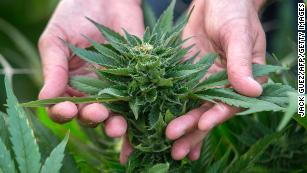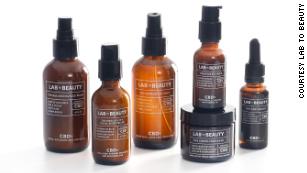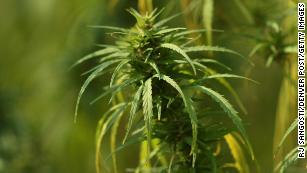Should CBD become a part of your wellness routine in these troubling times?
“After I finished a round of anti-seizure medications, there weren’t any other pharmaceuticals available to help me with my brain injury,” Frankel said. “All of the neurosurgeons [who] I consulted said I needed bed rest until the inflammation goes down.”As a mother and wife who needed to function, Frankel became restless as she struggled with pain due to the swelling in her brain. Then her husband stumbled upon CBD, a natural anti-inflammatory derived from the cannabis plant that could, perhaps, offer some hope.”The idea of finding relief through plant-based therapy was extremely appealing at the time. I knew about cannabis, but I wasn’t educated about all of the plant’s therapeutic components.”CBD helped ease Frankel’s inflammation, which had persisted as a result of her brain injury. And as the pain dissipated, she embarked upon a mission to help educate others about cannabis’ potential to provide pain relief in ways that modern medicine was unable to do. Her newly published book, “Women and Weed,” offers a primer to those interested in incorporating cannabis into their lives.
Cannabis 101
Cannabis is a complex plant with more than 400 chemical compounds, but the two most prevalent cannabinoids are tetrahydrocannabinol, or THC, and cannabidiol, or CBD — and they’re the compounds responsible for raising cannabis’ profile in the medical community.While THC is the compound that has psychoactive properties and gives the euphoria or high that people experience, CBD — its nonpsychoactive sister, so to speak — has emerged as a shining star — without the mind-altering potential of THC.
Hemp-derived CBD versus CBD derived from marijuana (cannabis)
CBD is found in both hemp and marijuana, both of which are varieties of the Cannabis sativa plant. The cannabis plant has two main subspecies, Cannabis indica and Cannabis sativa. But while hemp has been selectively bred to remove the cannabinoid THC almost entirely, the marijuana variety can contain up to 30% THC, according to Dr. June Chin, author of “Cannabis and CBD for Health and Wellness.” She has integrated medical cannabis in her practice for the past 19 years and is an advocate for better understanding of the science and medicine of cannabis.
In 2019, the Farm Bill made it legal to grow hemp in the United States and legal to sell hemp-derived CBD products grown in the US as well as abroad, as long as the hemp plants and hemp-derived products contain less than 0.3 percent of THC per dry weight. However, the bill does not cover CBD derived from marijuana, even if THC is removed.Unlike hemp-derived CBD, which is sold over the counter, CBD derived from marijuana requires a doctor’s prescription and is sold at regulated, licensed dispensaries (depending on your state laws) and used for specific conditions, according to Chin.
Cannabis: the state of the science
Cannabis used for medical purposes (i.e., CBD-derived from marijuana) has achieved some well-deserved notoriety, with therapeutic applications ranging from the treatment of nausea associated with chemotherapy to easing muscle spasms related to multiple sclerosis, among others.Potential therapeutic benefits of CBD, both hemp- and marijuana-derived, include reducing pain and inflammation, decreasing anxiety and aiding sleep, according to Chin, who has extensive experience in the application of CBD and cannabis across a spectrum of pathologies.

Charlotte Figi, the girl who inspired a CBD movement, has died at age 13Anxiety and stress relief, in fact, are the most common reasons that people turn to cannabis, according to a survey involving nearly 8,000 users of the plant.CBD calms the nervous system by working on the neurotransmitters regulating nerve cells in our brain, called GABA receptors, Chin explained. “It tells your body it’s time to power down — so there is a relaxation component.” This can be extremely helpful during stressful times when someone might experience heightened anxiety levels, like during the coronavirus pandemic, Chin added.
Anxiety relief in the time of Covid-19
Indeed, a more recent survey looking at consumer attitudes and behavior during Covid-19’s enforced “social distancing” revealed that people have been turning to cannabis and CBD as a way to cope with the Covid-19 pandemic. Specifically, among the general population, 10% are using cannabis, and 5% are using CBD.Just last week, researchers warned of a rise of anxiety and “coping responses” during the pandemic, and called for better monitoring of mental health as part of the global response to the pandemic.

Dr. Sanjay Gupta to Jeff Sessions: Medical marijuana could save many addicted to opioidsPeople living with coronavirus-related anxiety due to fear of one’s health or the health of loved ones, isolation, entrapment from quarantining, a disrupted routine, or simply uncertainty of the future might turn to CBD as a useful tool to get them through this difficult time. Of course, the trauma of health care workers on the front lines is another aspect of the pandemic calling for anxiety and pain relief, where CBD may be a welcome lifestyle intervention.”Health-care workers [who] are working long shifts are finding CBD helpful for restorative sleep and on their days off using it for pain and inflammation — from being on their feet all day, [and having] low back pain and neck pain,” Chin said in an email.”CBD can also help with panic attacks and insomnia as the prevalence of depression and PTSD mounts in response to this pandemic,” Chin added.Studies have also revealed that CBD may be a compound of choice for those struggling with drug addiction, and it may even have the potential to help opioid addicts avoid a relapse through reducing craving and anxiety, according to study author Dr. Yasmin Hurd, a neuroscientist at the Addiction Institute at Mount Sinai (AIMS) in New York.
Cannabis milestone
But perhaps the biggest success of CBD is the recently FDA-approved Epidiolex, a drug which consists of purified CBD from the cannabis plant. The FDA fast-tracked its approval in June 2018 for two rare and severe forms of epilepsy once government officials noted that children with intractable epilepsy experienced a significant decline in seizures — at a time when other conventional prescription anti-seizure medications could not offer any relief.

Dr. Sanjay Gupta remembers Charlotte Figi, the little girl who changed the worldDr. Elizabeth Thiele, director of the pediatric epilepsy program at Massachusetts General Hospital and professor of neurology at Harvard Medical School, who was a part of the team of doctors involved in the drug’s safety and efficacy trials, said that one patient was experiencing more than 100 seizures per day, but “a week later after CBD had four seizures in one day.”
Can CBD play a role in wellness?
Though at first it may seem strange, the CBD formulated for the development of Epidiolex comes from marijuana — the drug we often associate with adult recreational use.Why I changed my mind on weedMarijuana “doesn’t have a high potential for abuse, and there are very legitimate medical applications,” according to Dr. Sanjay Gupta, CNN’s chief medical correspondent, who is also a practicing neurosurgeon.But CBD derived from marijuana — which is legal in the form of Epidiolex and in states where medical marijuana is legal, as long as you have a doctor’s prescription — is different from “hemp-derived CBD,” the kind found in stores that is legal nationwide, as long as it contains less than 0.3% THC per dry weight.Perhaps that’s why hemp-derived CBD has become ubiquitous. You can find CBD at local drug stores, airports, and online markets, and it’s found in forms ranging from brownies to beauty creams. “The maker of Budweiser is developing a CBD-infused beer … and at your neighborhood cafe, you might find an option to add a shot of CBD to your morning latte. And that’s not even talking about the CBD beauty industry where you can find everything from CBD bath bombs to toothpaste to face masks,” Chin said.
A need for scientific research
But just because CBD is popping up everywhere, as a wellness booster — that doesn’t necessarily mean it should be.

He took the leap into cannabis. Now everyone is following“I think there is a huge amount of interest in the patient community regarding what [over-the-counter] CBD can do and what it can’t do,” Thiele said. “But I don’t think until we have the data, we can say ‘Yes, it’s good for this’ and ‘No, it’s not good for that.’ “While CBD creams, for example, may help ease pain according to anecdotal reports, “we need a lot more science on a clinical level … not only with CBD but with the other [cannabis] compounds,” Thiele said.Some preliminary research suggests that CBD may be useful for those who have trouble sleeping, while other research points to a potential role for topical CBD in skin health.”Studies have shown that CBD may actually decrease oil production and be useful in people who are acne-prone,” said Dr. Joshua Zeichner, director of cosmetic and clinical research in the department of dermatology at the Mount Sinai Hospital in New York.Additionally, there is anecdotal data showing that CBD oil is useful for a variety of inflammatory skin diseases including eczema and psoriasis, Zeichner said.”The skin has a large amount of CBD receptors, so there is great potential. But we need to separate the beauty hype with the reality,” Frankel said.And then there are athletes, who take CBD in anticipation of a tough workout in order to minimize soreness — something Frankel calls “a newer part of the trend.””People are pushing their bodies — with triathalons; CrossFit; boot camp — these are extremely challenging physical experiences — and so they are taking CBD topically and internally to protect against inflammation … hoping that CBD will alleviate it.”If you suffer from back pain and do a lot of yoga or SoulCycle, you could consider using [over-the-counter] CBD as a preventative three to four times per week to prevent chronic-use injury,” Chin said. But fully understanding the range of CBD’s therapeutic effects and its optimal application requires more extensive research. “We know that CBD is a potent anti-inflammatory. The limited studies that exist debate exactly when athletes should try to damper inflammation and when they should just let the body recover on its own. There is lack of research regarding CBD and exercise, and it is mostly anecdotal information,” Chin added.
CBD cautions
Experts say it’s critical to check with your doctor before trying any form of cannabis, particularly if you are on other medications. For example, if you are currently on an SSRI antidepressant, interactions with cannabanoids can occur.”It is important to check with your health professional, whether your CBD is derived from hemp or your CBD is derived from marijuana. While research on CBD is promising, it is still a compound with potentially wide effects in our body and can interact with the medications that you are taking … and can make their effects more powerful.” Chin said.Though hemp-derived CBD is legal, it remains unregulated. That means you should question health claims that may appear on labels.

FDA warns 15 companies for illegally selling CBD productsIn a move to crack down on the marketing of cannabis-related products, the US Food and Drug Administration previously issued warning letters to companies for selling cannabidiol products with “unsubstantiated” health claims that the products treat cancer, Parkinson’s disease and dementia, among other health conditions.”Selling unapproved products with unsubstantiated therapeutic claims — such as claims that CBD products can treat serious diseases and conditions — can put patients and consumers at risk by leading them to put off important medical care. Additionally, there are many unanswered questions about the science, safety, effectiveness and quality of unapproved products containing CBD,” said Dr. Ned Sharpless, acting FDA commissioner.The US Food and Drug Administration also recently sent a warning to 15 companies that have illegally sold CBD products, by adding it to food or marketing it as a dietary supplement.While it’s not illegal to sell products that aren’t approved by the FDA, it is illegal to add certain drug ingredients to products unless they’re approved food additives — and CBD is not one of them. Until it learns more about the effectiveness and safety of CBD, the FDA said it cannot generally recognize the ingredient as safe or approve products that contain it. In July 2019, New York City’s health department implemented a ban on CBD additives in food and drinks.
Do your homework
Because of these issues, in addition to checking with your doctor first about whether or not to consider taking CBD, it’s important to check a company’s website for product testing, indicated by a Certificate of Analysis, or COA.

Suddenly, CBD is everywhere. Here’s what’s nextA reputable company will have performed lab tests to ensure that the amount of CBD listed on the label is the amount present in the product — something that doesn’t always happen, according to a recent JAMA study, which found that out of 84 products sold online as CBD-containing products, only 26 were labeled accurately.Additionally, it should reveal that there are no pesticides, molds or heavy metals. “So everything on the label is in there — and everything you don’t want is not in there,” Frankel said.Chin also advises looking at the extraction method used in the production of hemp-derived CBD. “Extraction methods using propane, hexane, pentane and butane are cheaper but can leave toxic residue. Ethanol extraction is considered a safer method for extracting CBD from plant matter as is ‘supercritical CO2 extraction,’ which uses carbon dioxide under high pressure with cold temperatures,” Chin said.Lastly, read the label. “If it says hemp oil — that’s not CBD oil,” Frankel said. Unlike CBD oil, which contains a high concentration of CBD, hemp oil is a nutrient-rich oil from hemp seeds but contains no cannabinoids.
Opening a can of cannabis
Cannabis is such a personalized and customized therapeutic plant, and dosing is very individualized. A brownie containing 10 milligrams of CBD may be fine for one person but too much for someone else — and you may not feel its effects until 45 minutes after ingesting it. “There is a reason why we say ‘start low and go slow,’ ” said Chin, who prefers oils and tinctures to edibles because you can measure the dose.Get CNN Health’s weekly newsletter
Sign up here to get The Results Are In with Dr. Sanjay Gupta every Tuesday from the CNN Health team.Also, cannabis is metabolized differently by women and men. “Because of the female hormone, estrogen, women are more sensitive to the effects of the chemical compounds within cannabis — cannabinoids and terpenes,” Chin said, though she added that this is more pronounced with psychoactive THC than CBD.And even within your own body, you can build up a tolerance level, which may mean taking a break every once in a while. “I suggest women take periodic cannabis fasts to allow the endocannabinoid system to reset,” Chin said.”It’s a complex relationship with a plant that can provide incredible well-being and wellness — but you have to be willing to put in the work,” Frankel added.
Lisa Drayer is a nutritionist, an author and a CNN health and nutrition contributor.

